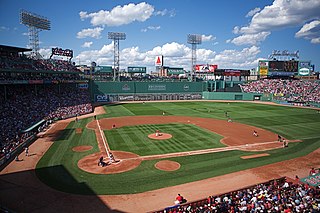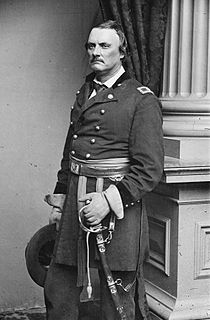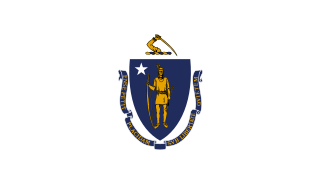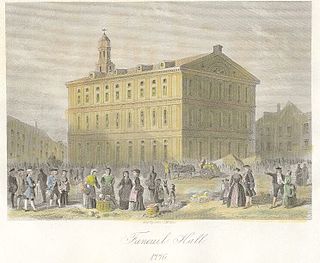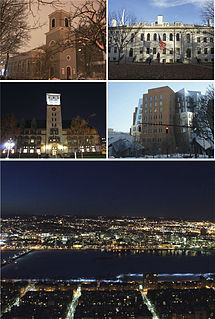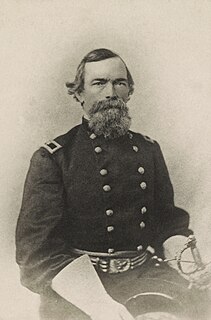
William Birney was a professor, Union Army general during the American Civil War, attorney and author. An ardent abolitionist, he was noted for encouraging thousands of free black men to join the Union army.

George Henry Gordon was an American lawyer and a Union general in the American Civil War.

Roy Stone was a Union Army officer during the American Civil War. He is most noted for his stubborn defense of the McPherson Farm during the Battle of Gettysburg. He later served as a general in the Spanish–American War

Joseph Bradford Carr was a general in the Union Army during the American Civil War.

Charles Camp Doolittle was a store clerk, general in the Union Army during the American Civil War, and a bank cashier.
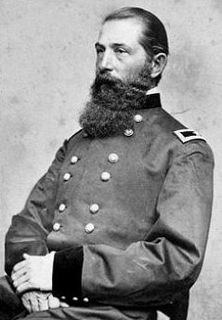
David Allen Russell was a career United States Army officer who served in the Mexican–American War and the American Civil War. He was killed in action as a brigadier general in the Union Army.

William Henry Forney was an Alabama legislator, brigadier general in the Confederate States Army during the American Civil War and U.S. Representative from Alabama from March 4, 1875 to March 3, 1893.

Edward Winslow Hincks was a career United States Army officer who served as a brigadier general during the American Civil War.

Henry Warner Birge was a Union Army general during the American Civil War.
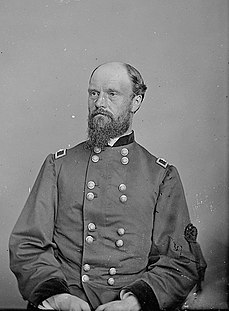
Simon Goodell Griffin was a Union Army brigadier general during the American Civil War, farmer, teacher, lawyer and New Hampshire state legislator.

Joseph Pope Balch was an American businessman from Rhode Island who served as an officer in the Union Army during the early months of the American Civil War.
Isaac Fitzgerald Shepard was a colonel in the Union Army during the American Civil War. His appointment as a brigadier general of volunteers was not confirmed by the United States Senate and expired on July 4, 1864.
Franklin Stillman Nickerson was a Union general during the American Civil War. He primarily served in the Department of the Gulf.

Caspar Crowninshield was a volunteer officer in the Union Army during the American Civil War.

William George Mackey Davis was a Confederate States Army brigadier general and blockade runner during the American Civil War. He was a lawyer and cotton speculator before the war and a lawyer in Washington, D.C. after the war.

Adley Hogan Gladden was lieutenant colonel and second commander of the Palmetto Regiment of South Carolina volunteers during the Mexican–American War and a brigadier general in the Confederate States Army during the American Civil War. He impressed General Braxton Bragg after defending Pensacola from Union Army bombardment and after a brief assignment at Mobile, Alabama, he was brought to Corinth, Mississippi, to command a brigade in the Army of Mississippi. He was mortally wounded at the Battle of Shiloh.

Young Marshall Moody was a Confederate States Army officer who was promoted to brigadier general near the end of the American Civil War. He was a teacher, merchant, and circuit court clerk in Marengo County, Alabama, before the war. He died from yellow fever during a business trip to New Orleans, Louisiana, on September 18, 1866.
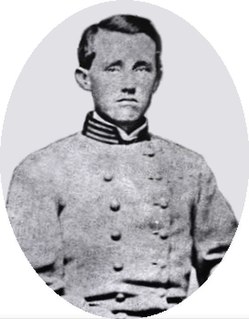
John Caldwell Calhoun Sanders was one the Confederate States Army's youngest brigadier generals during the American Civil War. He was killed in the Battle of Globe Tavern along the Weldon Railroad during the Siege of Petersburg, Virginia on August 21, 1864.
Ansel Dyer Wass was a Union Army officer during the American Civil War. Wass was born in Addison, Maine on November 12, 1832.
David Henry Williams was a railroad surveyor, civil engineer and writer in civilian life. He was a volunteer in the United States Army during the Mexican–American War and a volunteer Union Army colonel during the American Civil War. He was appointed colonel of the 82nd Pennsylvania Infantry Regiment on July 23, 1861. He was appointed a brigadier general in the Union Army on November 29, 1862 but his appointment expired on March 4, 1863 without being confirmed by the United States Senate. His actual highest rank remained colonel. After the expiration of his appointment in 1863, Williams resigned from the Union Army and returned to his career as a civil engineer and, after his health soon declined, a writer for newspapers and magazines.




